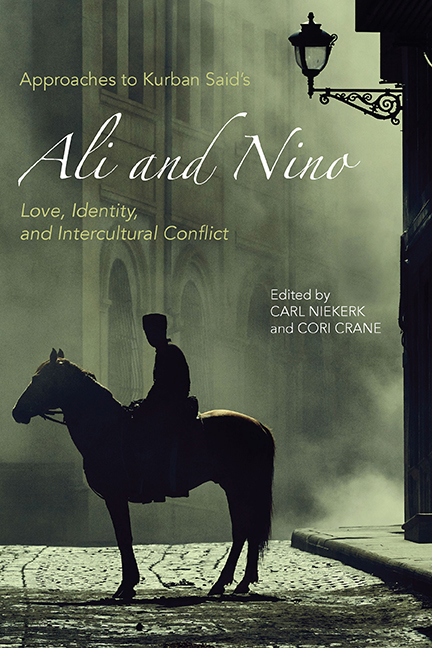Book contents
- Frontmatter
- Contents
- Acknowledgments
- Notes on Editions of and References to Ali and Nino
- Introduction: Ali and Nino as World Literature
- 1 Ali and Nino: The Novel as/of Cultural Translation
- 2 Crossing Borders, Crossing Disciplines: Ali and Nino in the Twenty-First Century
- 3 Glowing Rubies and Persian Daggers: The Role of Persian Poetry in Ali and Nino
- 4 Gendered Stereotypes and Cross-Cultural Moral Values through the Eyes of Kurban Said
- 5 Orientalist Itineraries: Cultural Hegemony, Gender, Race, and Religion in Ali and Nino
- 6 Gendered Conflicts in Muslim and Christian Cultures: Honor (and Shame) in Ali and Nino
- 7 Love and Politics: Retelling History in Ali and Nino and Artush and Zaur
- 8 “Herr Professor, Please: We'd Rather Stay in Asia”: Ali Khan Shirvanshir and the Spaces of Baku
- 9 The Female Body and the Seduction of Modernity in Ali and Nino
- 10 Seeing the Unseen: Symbolic Writing in Ali and Nino
- 11 Ali and Nino and Jewish Questions
- 12 Between Orientalism and Occidentalism: Culture, Identity, and the “Clash of Civilizations” in Ali and Nino
- Works Cited
- Notes on the Contributors
- Index
8 - “Herr Professor, Please: We'd Rather Stay in Asia”: Ali Khan Shirvanshir and the Spaces of Baku
Published online by Cambridge University Press: 30 August 2017
- Frontmatter
- Contents
- Acknowledgments
- Notes on Editions of and References to Ali and Nino
- Introduction: Ali and Nino as World Literature
- 1 Ali and Nino: The Novel as/of Cultural Translation
- 2 Crossing Borders, Crossing Disciplines: Ali and Nino in the Twenty-First Century
- 3 Glowing Rubies and Persian Daggers: The Role of Persian Poetry in Ali and Nino
- 4 Gendered Stereotypes and Cross-Cultural Moral Values through the Eyes of Kurban Said
- 5 Orientalist Itineraries: Cultural Hegemony, Gender, Race, and Religion in Ali and Nino
- 6 Gendered Conflicts in Muslim and Christian Cultures: Honor (and Shame) in Ali and Nino
- 7 Love and Politics: Retelling History in Ali and Nino and Artush and Zaur
- 8 “Herr Professor, Please: We'd Rather Stay in Asia”: Ali Khan Shirvanshir and the Spaces of Baku
- 9 The Female Body and the Seduction of Modernity in Ali and Nino
- 10 Seeing the Unseen: Symbolic Writing in Ali and Nino
- 11 Ali and Nino and Jewish Questions
- 12 Between Orientalism and Occidentalism: Culture, Identity, and the “Clash of Civilizations” in Ali and Nino
- Works Cited
- Notes on the Contributors
- Index
Summary
THE GEOGRAPHY TEACHER of the Imperial Russian Humanistic High School of Baku, Transcaucasia, poses a challenge that resonates throughout Ali and Nino : “It can therefore be said, my children, that it is partly your responsibility as to whether our town should belong to progressive Europe or to reactionary Asia” (3–4; Es hängt also gewissermaßen von Ihrem Verhalten ab, meine Kinder, ob unsere Stadt zum fortschrittlichen Europa oder zum rückständigen Asien gehören soll, 5). While the teacher's European leanings are clear, his Muslim students, Ali Khan Shirvanshir [Schirwanschir] among them, explicitly state that they see themselves as Asians. Throughout the novel, Ali Khan will not waver in his conviction. The space around him, however, is constantly changing. Whether Ali Khan likes it or not, Baku is indeed becoming Europeanized, be it through the construction of European-style villas or the arrival of European troops. Indeed, this change will also invade his private sphere, as he and his wife Nino will redecorate their house in a European manner in order for it to be suitable for diplomatic entertaining. Ultimately, Ali will die fighting the invading Russian soldiers; he cannot prevent his beloved city from being overrun. Ali's death is an inevitable result of the Europeanization of Baku. Ali's Asian space has been taken away from him.
Of course, the entire process is not linear and the space of the city is more complex than a simple Asian/European duality. Over the course of the novel, multiple spaces are opened up, spaces both European and Asian. The various settings outside Baku—Daghestan, Georgia, Persia— are clearly marked as either Asian or European. These spaces function as contrasts to Baku. Only the space of the latter is contested and appears malleable. Ali attempts to preserve this mutable space, but in the end cannot. Crucial to my argument is the modern philosophical contention that space is, indeed, transformable and produced rather than continuously existing from time immemorial. As Henri Lefebvre in his ground-breaking work The Production of Space states, “every society […] produces a space, its own space.” This cultural construction of space makes possible the multivalent spatiality of Baku in Ali and Nino.
- Type
- Chapter
- Information
- Approaches to Kurban Said's Ali and NinoLove, Identity, and Intercultural Conflict, pp. 152 - 167Publisher: Boydell & BrewerPrint publication year: 2017

